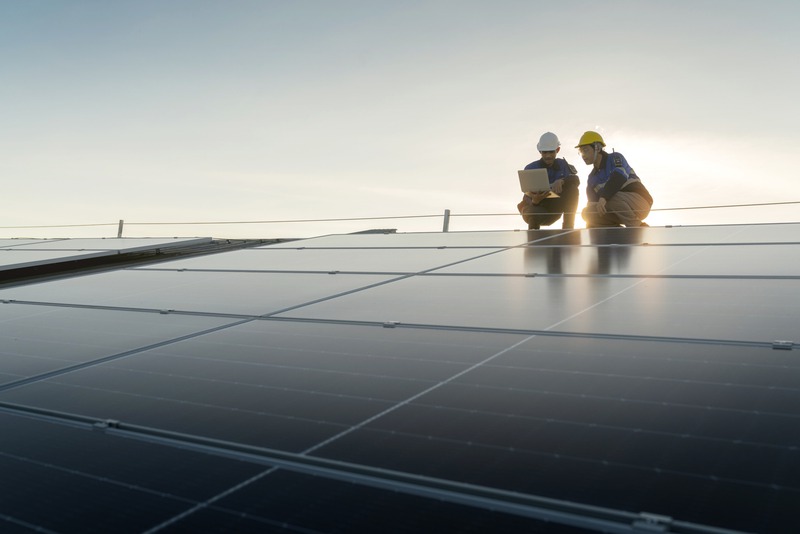
What Maintenance Do Commercial Solar Panels Require?
Commercial solar panels are a sustainable and cost-effective energy solution for businesses aiming to reduce their carbon footprint and energy expenses. However, these systems require regular maintenance to ensure their longevity and optimal performance. Commercial solar panels generally require minimal maintenance to ensure optimal performance and longevity.
However, some routine maintenance tasks can help maximize energy production, extend the solar system’s lifespan, and protect your investment. Here are some everyday maintenance activities for commercial solar panels:
1. Regular Cleaning
To ensure optimal performance from your renewable energy investment, it’s crucial to clean the solar panels periodically. Homeowners and businesses serviced by solar companies in Illinois should be especially mindful of removing dirt, dust, pollen, bird droppings, and other debris that can accumulate on panel surfaces. Dirty solar panels can significantly reduce energy production by blocking sunlight and shading the photovoltaic cells in a state known for its seasonal changes.
2. Inspecting for Damage
Conduct regular visual inspections of the solar panels, mounting hardware, wiring, and electrical connections to check for signs of damage, wear, or corrosion. Look for cracks, scratches, discoloration, or delamination on the panel surface, loose bolts, rusted components, or exposed wiring. Address any issues promptly to prevent further damage and ensure the safety and performance of the solar system.
3. Monitoring Performance
Implement a monitoring system to track the performance of your commercial solar panels and identify any anomalies or efficiency issues. Monitor key metrics such as energy production, voltage, current, and temperature to ensure the system operates optimally. Monitoring software or web-based platforms can provide real-time data and alerts, allowing you to promptly detect and address performance issues.
4. Trimming Vegetation
Trim trees, branches, or vegetation that may cast shadows on the solar panels and reduce energy production. Overgrown vegetation can block sunlight and shade the panels, decreasing efficiency and output. Keep nearby trees and foliage trimmed to ensure adequate sunlight exposure and maximize energy generation from your solar system.
5. Checking Inverter Performance
Monitor the performance of the solar inverter, which converts DC electricity generated by the solar panels into AC electricity for use in your commercial facility. Check for error messages, warning lights, or unusual noises that may indicate issues with the inverter operation. Address inverter problems promptly to prevent disruptions to energy production and ensure the reliability of your solar system.
6. Professional Inspections and Maintenance
Schedule periodic inspections and maintenance visits by qualified solar professionals to assess the condition of your commercial solar panels and ensure proper operation. Professional technicians can conduct comprehensive inspections, perform diagnostic tests, and identify potential issues or maintenance needs. They can also perform specialized tasks such as electrical testing, module performance analysis, and inverter diagnostics to optimize the performance and efficiency of your solar system.
7. Checking and Tightening Connections
Regularly inspect electrical connections, junction boxes, and wiring to ensure they are secure and corrosion-free. Loose or damaged connections can lead to voltage drops, power losses, and safety hazards. Tighten loose connections and replace damaged components to maintain optimal electrical conductivity and system performance.
8. Inspecting Racking and Mounting Systems
When conducting these inspections, it’s often a good idea to enlist the services of a local solar company. They can provide expertise in assessing the racking and mounting systems that support the solar panels, ensuring they are secure and structurally sound. These professionals are usually well-versed in spotting signs of corrosion, rust, or deterioration, especially in areas exposed to harsh weather conditions. With the help of a local solar company, you can promptly repair or replace damaged components, fasteners, or brackets to prevent structural failures and maintain the stability and integrity of the solar array.
9. Testing and Calibrating Monitoring Equipment
Regularly test and calibrate monitoring equipment, sensors, and meters used to track the performance of your commercial solar system. Verify the accuracy of measurements and data collected by the monitoring system to ensure reliable performance monitoring and data analysis. Calibration ensures that the monitoring system provides accurate information for assessing your solar panels’ energy production, efficiency, and performance.
10. Performing Preventive Maintenance
Implement a preventive maintenance program to proactively address potential issues and optimize the performance of your commercial solar panels. Develop a maintenance schedule that includes routine inspections, cleaning, testing, and servicing of critical components. Keep detailed records of maintenance activities, observations, and performance data to track system performance over time and identify trends or anomalies that may require attention.
Final Thoughts
Maintaining commercial solar panels is essential for maximizing energy output and extending operational lifespan. Regular cleaning, physical and electrical integrity inspection, and immediate repairs of identified issues are crucial components of a well-executed maintenance routine. The key to successful solar panel maintenance lies in adhering to a scheduled plan, staying vigilant for potential problems, and engaging with professional services when needed.
